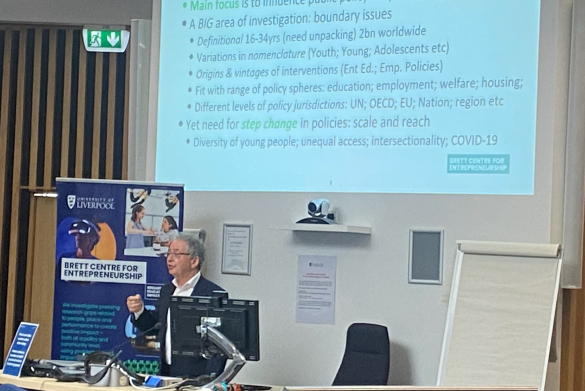New report in collaboration with OECD sets out agenda to support young entrepreneurs

The Management School’s Brett Centre for Entrepreneurship (BCfE), has presented a new report in collaboration with the Organisation for Economics Co-operation and Development (OECD), that sets out a fresh agenda for supporters of young entrepreneurs.
The 'Youth Entrepreneurship Policy: Contemporary Challenges and Ways Forward' policy paper, written by Management School’s academics Professor Robert Blackburn and Dr Jordan Gamble, was presented during an event celebrated on 12 June 2024 that workshop brought together key experts in the field.
The new paper addresses the pressing challenge of rising youth unemployment in the UK and globally, exploring the central question of whether entrepreneurship can serve as a viable option to facilitate the transition of young people into adulthood.
During the presentation, Robert unveiled the case for a step-change in support for young people, which considers and meets the array of challenges they encounter when trying to realise their entrepreneurial ambitions.
Download summary of key findings
The paper shows evidence of an ongoing gap between the intentions of young people, with for times as many reporting they would consider running a business than those actually doing so.
As well as shedding light on the barriers preventing young people from venturing into entrepreneurship, the report also offers recommendations to policymakers on how to better support budding entrepreneurs though better tailored education, communications and coverage.
“Clearly, there is a case for a more strategic policy framework but what is crucial is the type of interventions and how it will reach all types of young people in a dynamic environment.”, said Robert.
“We need to raise the visibility of these challenges to help stimulate changes in our culture and the policy landscape.”

Dr David Halabisky sharing the OECD’s experiences and programmes focused on young people.
The report draws on evidence from experts, presented in a series of workshops hosted by the BCfE in Liverpool, London and Paris, and the most salient evidence on the topic, including research by academics, private and public organisations and policy reports.
“It’s great to see the results of this workshop series on future directions for youth entrepreneurship policy,” said OECD Centre for Entrepreneurship, SMEs, Cities and Regions Project Co-ordinator, Dr David Halabisky.
“The multi-stakeholder discussions have yielded valuable insights on how youth entrepreneurship support needs to be updated and made more relevant for the next generation of entrepreneurs.
“We will help disseminate these ideas and potential solutions, notably through the OECD-EU Youth Entrepreneurship Policy Academy.”

L-R Event speakers: Rudy Parengal (young entrepreneur and ABJAK Founder) and Professor Dilani Jayawarna (Management School's Professor of Entrepreneurship).
Challenges for young entrepreneurs
The research presents a plethora of challenges young people face when considering entrepreneurship, from contextual factors including institutional, market and cultural barriers to those intrinsic to youth.
Of particular concern in the UK is the decline in support for young people entering the labour market and considering entrepreneurship, exacerbated by the inability to access various programmes due to Brexit and a diminution in the infrastructure for youth as a result of austerity measures.
Additionally, the COVID-19 pandemic has accelerated a shift towards life ‘online’ and a reduction in face-to-face economic and social interaction, which has a deleterious impact on young people’s training and work experiences, and their ability to develop new networks.
On the upside, the study indicates the shift towards a ‘digitalised’ world presents some entrepreneurial opportunities for young people, including adaptations to existing products and services and the opening of new markets.
However, although the new ‘gig’ economy has generated opportunities for entrepreneurship, the paper stresses these can involve precarious ways of earning a living often in low-barrier to entry sectors.
Young people need more agency in policy making
The research team argue support for youth entrepreneurship needs to be much more closely aligned to the motivations of young people, and where and how they interact if its relevance, reach and effectiveness is to develop.
This includes engagement through social, as well as educational, business and professional networks, with delivery both in person and online.
Policymakers also need to manage the over-reliance on educational institutions and formal systems, which is one of the weaknesses of current youth entrepreneurship policies, because whilst important, not all young people are involved in further or higher education.
The report recommends youth entrepreneurship policies should embrace those on different life-courses and facing different challenges to create an enabling environment in which all young entrepreneurs can thrive whatever their starting point.
The policy paper also asserts that the objectives, content and delivery of entrepreneurship education programmes for young people have well-established paths but require improvement.
The researchers found that some of the popular methods of introducing entrepreneurship to young people could be counterproductive.
For example, an emphasis on ‘competitions’ in schools, may lead to negative as well as positive learning outcomes and accentuate existing gap between sub-groups.
Finally, the paper urges policymakers to address the issue of inconsistency in coverage, that is, some groups of young people are excluded from provision, generating inequality and opportunity.
To mitigate this, the report suggests entrepreneurship should be presented as an opportunity for all, as well as reflect the diversity of young people, irrespective of academic subject or level of education.